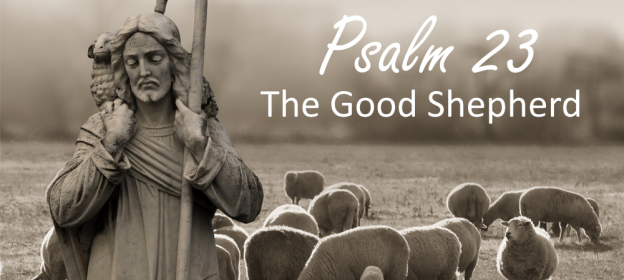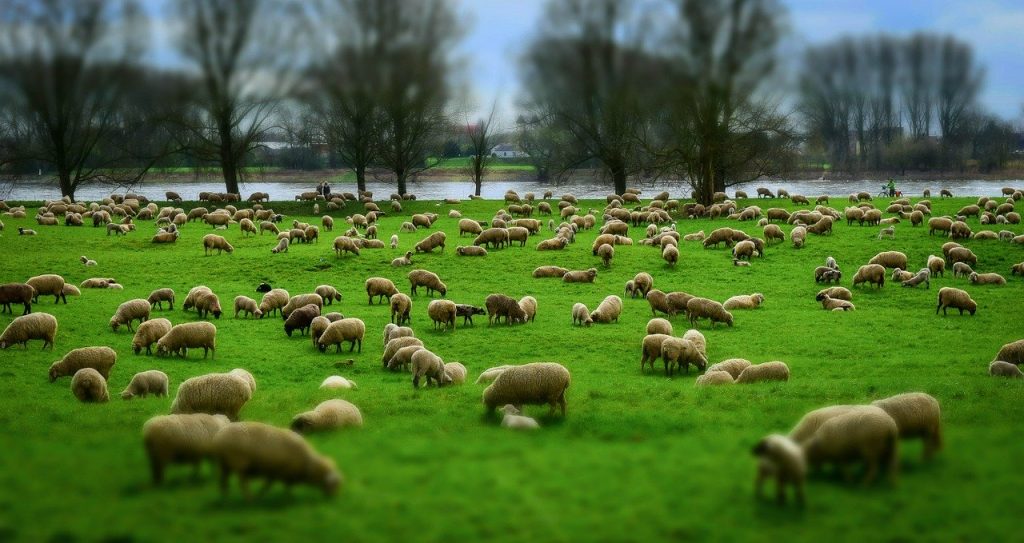He leads me in paths of righteousness
Psalm 23:3b
As well as restoring our soul, this week, we’ll look at how the Lord calls us, leads us and even drives us, along the right paths.
Our passages: Acts 8:1-5 & Psalm 23:3. Preacher: Ian Bayne (3rd May 2020).
Watch the Sermon
Recap
The rest and plenty described in Psalm 23:1-3 also carry a bitter side to them. This rest and plenty is so amazing because we are not as we ought to be. The events of the fall (Gen 3) brought about an ongoing tragedy for humanity, which is evident in our lives (e.g. death and suffering). We also need to be restored because of wear and tear from work and experiences. Therefore we need to constantly ask for forgiveness and strength from God.
Fortunately, God looks at our potential, not us as we are. As we are restored, we have a sense of purpose and reason to live.
Some may be reminded of the first question answered in the Westiminister Shorter Catechism: What is man’s chief aim?
To glorify God.
Westminister Catechism Question 1 answer
We enjoy meeting at least a part of this aim now. In Christ’s strength we can change and become what we are in him: holy and righteous. We’re not there yet, but it is possible.
Explanation
Today we’ll look at the second part of verse 3.
He leads me in paths of righteousness for his name’s sake.
Psalm 23:3b ESV
3 points and then application:
1. Our shepherd is a qualified guide
Some years ago I went on a holiday overseas. We were part of a Tour party travelling through Italy Greece, Athens, and Ephesus. Each time we were at a place we would have a local tour guide appointed to us.
The local guide would have local experience and understanding of the local culture that was useful to us. No-one else could explain the area we were in as well.
Through life, the Lord Jesus is our guide. He is qualified to guide us because:
1) He knows his sheep very well
He knowsL
- the condition and weaknesses of his sheep
- the best path for his sheep
- what the sheep have experienced
- our current condition.
2) He’s experienced all we have experienced
Therefore he had to be made like his brothers in every respect, so that he might become a merciful and faithful high priest in the service of God, to make propitiation for the sins of the people.
Hebrews 2:17 ESV
He has experienced being human and is able to sympathise with us.
For we do not have a high priest who is unable to sympathize with our weaknesses, but one who in every respect has been tempted as we are, yet without sin.
Hebrews 4:15 ESV
3) He knows the right paths to take for our safety and productivity
Our passage today states: “He guides us in paths of righteousness”. We don’t know which paths to take in life: many are frought with danger.
There is a way that seems right to a man, but its end is the way to death.
Proverbs 14:12 ESV
From time to time we will choose ways that are wrong.
The choices before us may be good opportunities that we mustn’t miss.
As Jesus passed on from there, he saw a man called Matthew sitting at the tax booth, and he said to him, “Follow me.” And he rose and followed him.
Matthew 9:9 ESV
We have to apply some discernment to following Jesus. He was without sin: we can’t follow him on repentance from sin as He never needed to change. In these cases there are servants of the Lord we can follow and take example from:
Brothers, join in imitating me, and keep your eyes on those who walk according to the example you have in us.
Philippians 3:17 ESV
2. He guides his sheep
He guides by engaging in the moment by moment management of his sheep. Our shepherd is an intensive manager; intensive in style and substance.
In terms of belief in God, there are theists and deist. A deist believes God is hands-off: winding up the clock at the beginning of creation and then letting things run.
If we take our guide from the Bible, we can be theists:
him who works all things according to the counsel of his will,
Ephesians 1:11b ESV
He guides us in three ways:
1) Calling
He calls us personally, through His Word (the Bible), and through depositing the Holy Spirit in us.
When he has brought out all his own, he goes before them, and the sheep follow him, for they know his voice. [5] A stranger they will not follow, but they will flee from him, for they do not know the voice of strangers.”
John 10:4-5 ESV
We recognise God is has spoken to us.
All Scripture is breathed out by God and profitable for teaching, for reproof, for correction, and for training in righteousness,
2 Timothy 3:16 ESV
All of God’s word is a signal and call to us to follow Christ.
John 16:5-13 teaches more about the Holy Spirit.
2) Leading
Jeus leads from the front: by example. His main example is sacrifice.
Then Jesus told his disciples, “If anyone would come after me, let him deny himself and take up his cross and follow me.
Matthew 16:24 ESV
We should become living sacrifices to God.
I appeal to you therefore, brothers, by the mercies of God, to present your bodies as a living sacrifice, holy and acceptable to God, which is your spiritual worship.
Romans 12:1 ESV
3) Driving
We may not think of this, thinking the sheep follow along willingly. But subtly (and sometimes less subtly) He drives us on the paths we need to take.
Shepherds usually have dogs. They have a heading dog, such as a border collie which is quiet and leads the sheep on.
In NZ the shepherd also has a hunter dog which is noisy and works from the back; moving sheep that are refusing to move.
Scripture indicates that Jesus works to drive us as well.
Examples from scripture:
Joseph had 11 brothers who didn’t like him because he was the favourite, so they sold him into slavery. While in slavery he was accused of rape and put into prison.
If God had informed Joseph all that was going to come, would he have followed the path he did?
So it was not you who sent me here, but God. He has made me a father to Pharaoh, and lord of all his house and ruler over all the land of Egypt.
Genesis 45:8 ESV
God’s providence brought him to Egypt.
Moses, likewise, was called by God when he saw a burning bush. He was quite reluctant to lead God’s people out of Egypt and God had to encourage him along the way.
Esther is beautiful and brought before the king of the time. She is put there so that she may rescue the people from a coming genocide.
Jonah didn’t agree with what God wants him to do. He goes the other way. God brings him back and re-commands him.
Our passage today:
In our passage today, Stephen was the first martyr for the church. He was stoned to death, following which there was a lot of persecution. Except for the apostles three members of the church were scattered.
But you will receive power when the Holy Spirit has come upon you, and you will be my witnesses in Jerusalem and in all Judea and Samaria, and to the end of the earth.
Acts 1:8 ESV
But by the time of Acts 8 the apostles hadn’t travelled much. Events were required to scatter them.
Acts 15:37-40 recounts a disagreement between Paul and Barnabas that caised them to split up, taking the gospel in two different directions.
God drove me into preaching. Drought, snow and family circumstances brought me into ministry. We can sometimes be a little comfortable and lazy, but God can drive us along the path we need to take.
Application
The Lord’s guidance is for us.
We need to watch out as there could be immediate danger present in our lives. That’s not a time for gentle guidance, but for immediate action.
We need to wake up. As is said: He who snoozes looses.
We lie down in green pastures so we can ruminate and be able to grow. We don’t lie down to sleep: we are not to participate in comfort for comfort’s sake.
Don’t rest on your lauerels
“And to the angel of the church in Sardis write: ‘The words of him who has the seven spirits of God and the seven stars. “‘I know your works. You have the reputation of being alive, but you are dead. [2] Wake up, and strengthen what remains and is about to die, for I have not found your works complete in the sight of my God.
Revelation 3:1-2 ESV
The church in Sardis had a name for being a successful church, but we can’t rely on past successes.
We need to keep moving forwards and we can do this with confidence as believers, using our shepherd’s wisdom.
Trust in the LORD with all your heart, and do not lean on your own understanding. [6] In all your ways acknowledge him, and he will make straight your paths.
Proverbs 3:5-6 ESV
Rely on God’s wisdom
Rely on God’s ways and God’s wisdom to guide you.
And we know that for those who love God all things work together for good, for those who are called according to his purpose.
Romans 8:28 ESV
Even though we may not understand what to do, God knows and we can walk on in wisdom, sometimes being driven and sometimes being called.
The paths ahead are full of hazards. There are:
- Internal issues: sin in us
- Intrinsic hazards: related to the culture and times
- Inherent hazards: present always in a fallen world.
Thank the Lord that “He leads me in paths of righteousness for his name’s sake.”
Resources
Questions? Please contact us. Inspired? Come and worship with us on Sundays.



